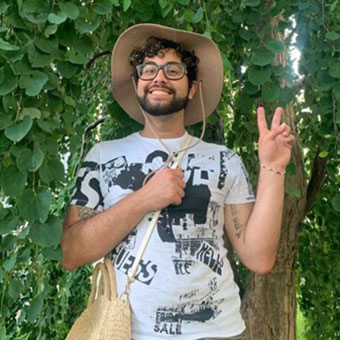MJ Ibrahim ’23
 MJ Ibrahim ’23
MJ Ibrahim ’23
He/Him/His
- Majors: Health, Science, Society and Policy (HSSP) and Biology majors
- Minor: Arabic
- Accomplishments: MLK Fellow Board Member | Arabic Department UDR | Admissions Diversity Coordinator | URCC Peer Research Mentor | Network of Arab Students Vice President and Secretary
Spotlight Interview
The responses have been edited for clarity and length.
URCC: What is/was your creative or research project topic or area? What research or creative questions are you exploring?
MJ: My research project was based on the experiences of undocumented students in higher education in the U.S., specifically outlining policy recommendations for post-secondary institutions to implement to make their campuses more “undocu-friendly” to support their out-of-status students academically, socially and financially. I’m exploring questions on problems undocumented students face during their studies that many people aren’t aware of and ways we can bring awareness and address these unique obstacles.
URCC: What sparked your interest in your chosen academic research area? Did you engage in any creative or research projects prior to your current project? If so, can you tell us about them?
MJ: As an immigrant on a liminal legal status, I experienced obstacles in attaining a college education and the lack of knowledge among professionals on how to handle my specific situation. It’s unfair and unfortunate that students with similar backgrounds as mine have to jump through massive hoops on their own. Reflecting on experiences, both mine and my peers, sparked a need to address these injustices. The barriers are high and the awareness is low, and I aim to switch these narratives on our own campus.
URCC: What research skills did you need to get started? How did you get training or acquire those skills?
MJ: I needed to know how to structure my research project, conduct relevant literature reviews, set up interviews and formulate an analysis that addresses the academic outcome disparities seen among undocumented students. I was a research assistant at Boston Children’s Hospital and an intern at the Schneider Institute for Social Policy, where both research projects were related to health disparities. Within these two opportunities, I was introduced to these skills that were further supplemented by my faculty mentor’s (Dr. Kristen Lucken) guidance and advice.
URCC: What type of funding have you received for your project, including grants, fellowships and paid research assistant positions?
MJ: I applied for and received funding from the Provost’s Summer Undergraduate Research Fellowship and the Jerome A. Schiff Undergraduate Research Fellowship (for academic year research).
URCC: Did you enroll in research for credit? If so, which course(s)?
MJ: Yes, for HSSP 89A (Internship & Analysis) for the HSSP Hands-On Experience requirement.
URCC: Are you/did you experience any unexpected benefits from engaging in your project? Are you doing research now?
MJ: Yes! After conducting my research project, it confirmed my postgraduate plans to pursue a PhD in sociology specializing in liminal status immigrants and the sociopolitical issues that hinder life outcome success. It felt very validating and “right” throughout the entire process, and I couldn't thank the opportunity from the URCC and my amazing faculty mentor Dr. Lucken for making my independent research experience an amazing one! I am currently undertaking another project building off this research project. I am aiming at creating an interdepartmental resource database within Brandeis for out-of-status Brandeis undergraduate students to highlight resources available to them, as well as increase awareness among several departments about what they can do to further support undocumented students on our campus.
URCC: What advice do you have for students who want to participate in research?
MJ: I say go for every opportunity you see! Apply to all the research positions and funding that interest you! Make appointments with the Undergraduate Research and Creative Collaborations (URCC) and Academic Fellowships departments! There are so many resources out there for you to grab. All you have to do is go for it. I owe it to all the advisors and professors I spoke to about different research opportunities. Having a supportive and wide network of professionals rooting for your success is an amazing thing, and you should take advantage of every single opportunity you see.